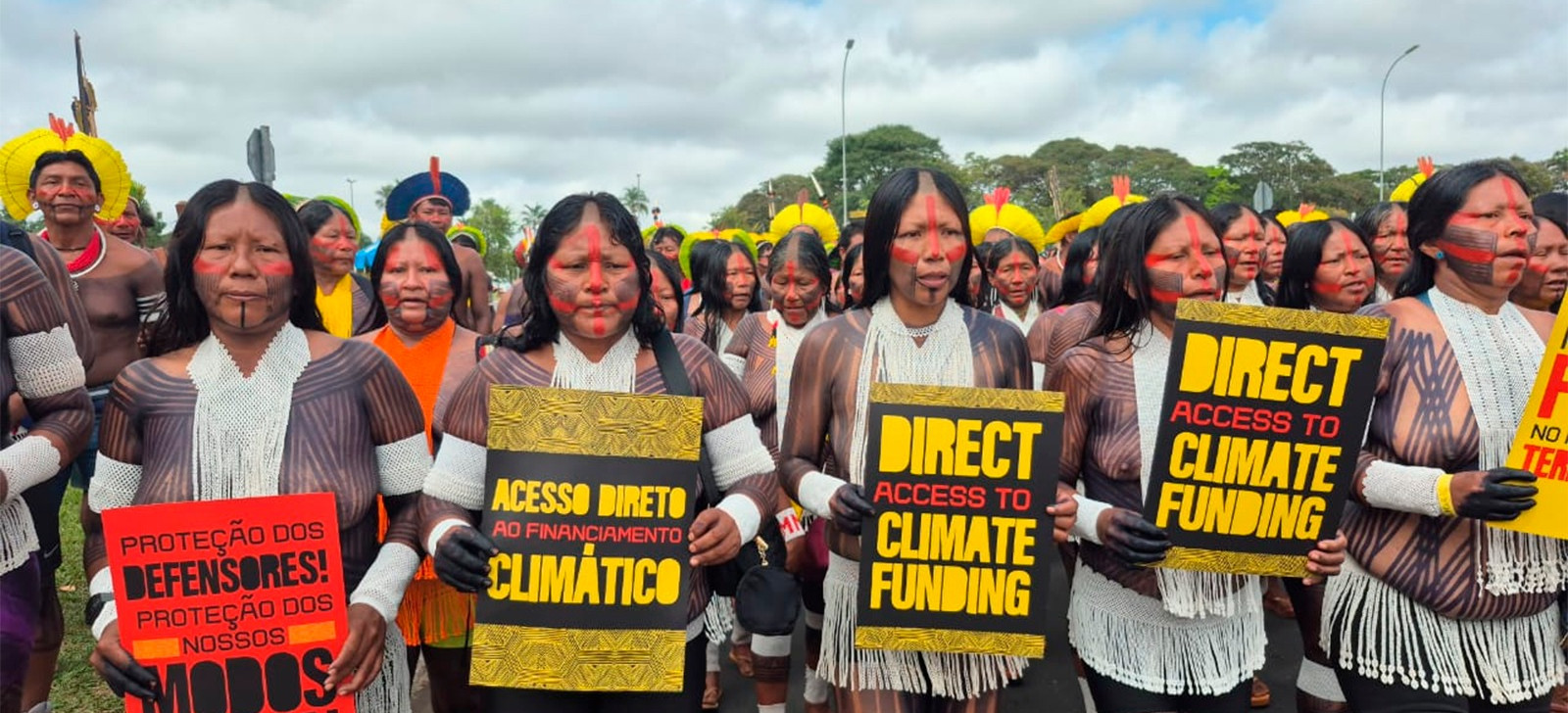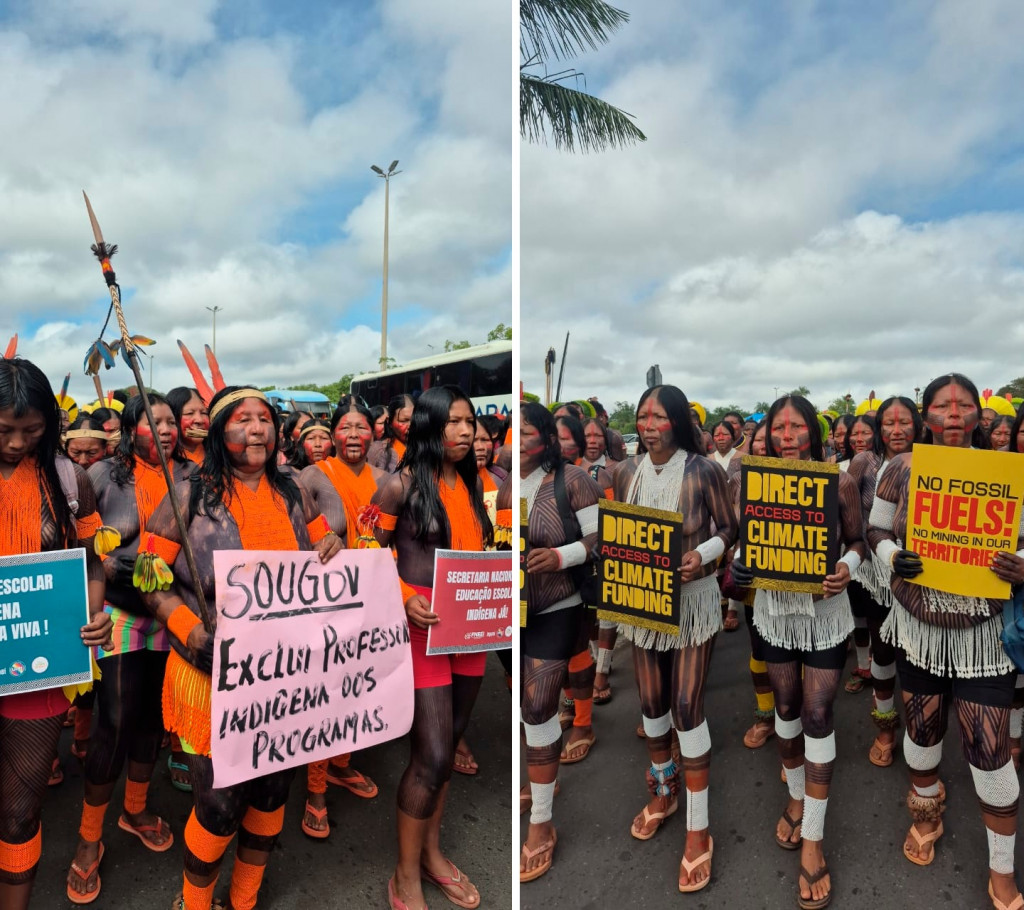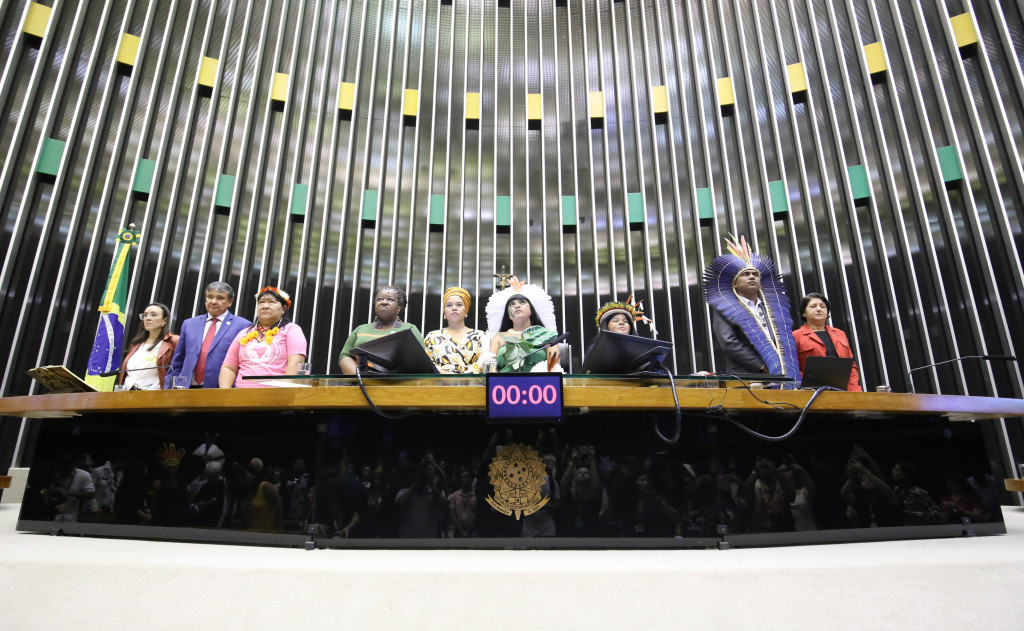Indigenous march bills foresee obstetric protection and economic emancipation
08 de April de 2025

By Ana Cláudia Leocádio – From Cenarium
MANAUS (AM) – Deputy Célia Xakriabá (Psol-MG) submitted, on Tuesday the 8th, four Bills that benefit indigenous communities, ranging from protection against obstetric violence towards indigenous women to the granting of tax incentives for agroecology. The initiative was announced after the march of the Free Land Camp (Acampamento Terra Livre (ATL)), which brings together around 8,000 original peoples, in Brasília, and who went to the National Congress to demand respect for the rights guaranteed by the Federal Constitution.
The march ended in front of the Congress, where a solemn session was held in the Chamber of Deputies’ plenary, in honour of the 20 years of the Articulation of the Indigenous Peoples of Brazil (Apib) and the 21st edition of the ATL, which this year brings together over 200 peoples who occupy the federal capital of Brazil to claim rights and demand the demarcation of their lands.
Bill 1527/2025 sets out rules and guidelines for the prevention and fight against obstetric violence towards indigenous women, “aiming to guarantee respect for cultural particularities and physical and psychological integrity during pregnancy, childbirth and the postpartum period”.

According to Xakriabá, in her justification, studies indicate that between 2015 and 2021, the maternal mortality rate among indigenous women was 115 per 100,000 live births, a figure significantly higher than the rate among non-indigenous women, which was 67 per 100,000 live births. “These figures are far above the goal set by the UN, which aims to reduce to fewer than 30 deaths per 100,000 live births by 2030,” she points out.
Bill 1528/2025 proposes the creation of climate insurance for forest peoples. In the proposal, the MP foresees the amendment of Law No. 10.420, of 10 April 2002, and Article 52 of Law 11.775, of September 2008, to include indigenous family farmers, quilombolas, riverine peoples, extractivists, and artisanal fishers across the national territory among the beneficiaries of the Crop Guarantee Programme (Garantia-Safra).
“This proposal seeks to address an urgent demand of traditional peoples and communities, especially family farmers, indigenous people, quilombolas, riverine peoples, artisanal fishers, nut producers and other extractivists, who face socio-economic vulnerability and are severely affected by extreme climate events,” justifies Xakriabá.
The third proposal (Bill 1529/2025) amends three laws to provide for the support of origin designation of products or services that are commercialisable and result from traditional indigenous ways of occupying territory. It is a way of creating income for indigenous people directly linked to ancestral knowledge that generates production in their territories.
According to the deputy, “the objective is to promote the sustainable development of traditional communities, linking the dimensions of economic production, social promotion, as well as valuing culture, ways of life and the environment”. In addition to protecting traditional modes of occupation and production, the proposal also aims to economically emancipate these peoples.
Bill 1530/2025, meanwhile, establishes the Support Fund for Agrosilvopastoral, Extractivist and Artisanal Production carried out by Indigenous Peoples, Quilombolas and Traditional Communities (Funap-Tradicionais). The idea is to use the fund’s resources “to finance and support research and actions aimed at enhancing, assisting and encouraging the development of sustainable and agroecological production for national and international commercialisation”. Additionally, it proposes the promotion of agroecology, which is practised in these traditional territories.
Second day of ATL
The second day of ATL was marked by the march to the National Congress, in the morning, where some groups were allowed entry, such as chief Agnelo Wadzatse, of the Xavante Village, located in the municipality of Barra do Garças (MT). He said he was one of the founders of the Camp, which had its first edition in 2004, and evaluated the ups and downs in these 21 years of struggle with his kin.
“We’ve had achievements, victories, challenges and defeats. But also through this mobilisation we managed some demarcations of indigenous lands and, at the national level, in terms of health, we achieved the creation of Sesai [Special Secretariat for Indigenous Health],” he highlighted.

The chief emphasised that, currently, the main battle of indigenous peoples is against the Temporal Framework, provided for in Law 14.701/2023 in force, which establishes the date of the promulgation of the Federal Constitution, 5 October, as the cut-off point for indigenous peoples to claim the demarcation of their lands. The law is being challenged in the Supreme Federal Court (STF).
“They must respect us — we have already lost much land. The riches we have, we are preserving and maintaining so that they are not destroyed, otherwise the rivers will end, the forest will end, the cerrado will end, and the water will end. Pollution will worsen for those living on the margins, which are us, the indigenous peoples. Water is our life, our breath. We can barely breathe because of all this deforestation,” he declared.
The solemn session was also attended by chief Raoni, who brought a message of encouragement to the kin taking part in the mobilisations. According to the interpreter, Raoni said that he is already tired, but in good health, and that now it is time for others to keep fighting even more for the rights of indigenous peoples.
The march featured various ethnicities wearing traditional garments, body paint with urucum and jenipapo, and chanting throughout the entire journey from the Funarte headquarters, in Brasília, to the National Congress. Xikrin men and women, from the municipality of Parauapebas-PB, carried signs in defence of indigenous education, while the Xavante held up signs also in English demanding access to climate financing funds and opposing fossil fuels.

